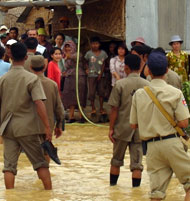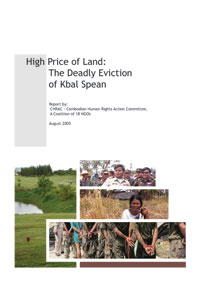Land Rights
Statement | Concerns on eviction of 168 families in Preah Monivong Hospital
29 June 2006
The Cambodian Human Rights Action Committee (CHRAC), a coalition of 21 NGO members, is concerned about the eviction of 168 families who have been living in Preah Monivong Hospital.
CHRAC observed that the Ministry of Interior sent its forces of more than 200 personnel equipped with arms, tear-gas guns, electric shock batons and shields to surround and force people to move from their houses to a new location situated in Ang Snuol district, Kandal province, more than 30 km away from Phnom Penh. The armed forces prevented people from entering or leaving the area to communicate with each other, and disconnected water and electricity. In particular, they prohibited human rights monitors and journalists from monitoring the eviction process.
Article | Frenzied development in Cambodia pushes its people out of the capital to squalid conditions
14 June 2006
At the early hour of 4 am on June 6, 2006 around 700 police and military police in full riot gear circled Sambok Chap village and erected roadblocks - as far as 1km away - to prevent access to the village. In a show of determined force rarely seen in the capital, the police build up would be the final push by the authorities to forcefully evict the remaining residents of Sambok Chap village on the banks of the Tonle Bassac River.
The eviction of Sambok Chap village by the Sour Srun Company began on May 3, 2006, and was authorized by the Phnom Penh municipality. Within a month, more than 1300 families would be moved from this central location to 2 relocation sites, some 20km out of central Phnom Penh.
Statement | Forced Eviction of Sambok Chab Village
7 June 2006
The Cambodian Human Rights Action Committee (CHRAC), the Housing Rights Task Force (HRTF) and
the Resettlement Action Network (RAN) are deeply troubled by the actions of the Phnom Penh municipality for using excessive force to evict and dismantle houses of the residents of Sambok Chab village, and in their arrest of nine persons including residents, journalists and NGO staff.
On 6 June 2006, approximately one thousand police and military police forces gathered in Sambok Chab
village heavily armed with rifles, electric batons, tear gas and riot gear. They threatened human rights
monitors and local and international journalists, and then confiscated their cameras and prevented them from recording police actions. The Phnom Penh Municipality chose to use violent means against the poor people rather than using a non-violent, transparent approach.
Media Album | Tonle Bassac Eviction
1 June 2006
A day- by-day chronology in photographs of the Sambok Chap village eviction.
Statement | Concern over the eruption of Violence in Sambok Chab Village
31 May 2006
The Cambodian Human Rights Action Committee (CHRAC) and Housing Rights Task Forces (HRTF) are gravely concerned with the ongoing human rights abuses leveled against the residents in Sambok Chab village (Village 14), Khan Chamcarmon, Phnom Penh.
Violence erupted this morning when village guards began destroying a home at the site. The demolition of homes led to the injury of two community members-a young girl and a pregnant woman. The young child required hospitalization due to the injury. These incidents, coupled with the deteriorating conditions in Sambok Chab, led to a violent reaction by the community. Villagers armed with sticks and rocks destroyed village offices and a fence surrounding the site in an expression of their anger and frustration with the eviction process.
Statement | Resolution over the Land Disputes in Kbal Spean Village
25 May 2006
The Cambodian Human Rights Action Committee (CHRAC), a coalition of 21 local NGOS, is pleased with the reported resolution of the long-standing land dispute in Kbal Spean Village, Poi Pet Commune, Banteay Meanchey province. But CHRAC remains concerned by the lack of justice provided over the killings of five people during the 2005 eviction of Kbal Spean community.
Provincial authorities, reportedly acting on the instructions of the Prime Minister, last week negotiated a settlement between 218 families living on the land and their village chief, who had laid claim to all their land. The settlement permits the families, who had previously each had 10-meter-by-20 meter plots of land, to retain 8-meter-by-20 meter plots of land. The remaining land goes to the village chief.
Statement | Eviction of People in Sambok Chab Village
4 May 2006
The Cambodian Human Rights Action Committee (CHRAC), a coalition of 21 NGOs, is concerned with the measures taken by the Khan Daun Penh authority and the Phnom Penh municipality to relocate people who live in village 14 (Sambok Chab village) Khan Chamcarmon, Phnom Penh to a new location situated in Trapeang Anh Chanh village, Sangkat Trapeang Kra Sang, Khan Dangkor, Phnom Penh.
CHRAC has carried out a thorough investigation of this case and has found that it is unclear how the new land will be distributed in fairness, since the statistics put together by the people in six communities and the statistic of local authority are different. This has led people to feel unsure of whether they will be relocated or not. Furthermore, the authority has not yet built basic and adequate infrastructures and services such as health center, school, market, sewers, and electricity system at the new location.
Briefing | Harmful Effects of Economic Land Concessions on Poor Cambodians
20 November 2005
In 2001, the Cambodian government instituted a new land law in part to standardize the awarding of economic land concessions which, hitherto, were governed by little legislation which, in any event, was mostly ignored. Economic land concessions in Cambodia normally involve very large tracts of land and are similar to long leases; they are usually for 70 years with a right of extension. The land law provided a general framework for economic land concessions and called for adopting administrative rules which the government is nearly finished preparing. It is doubtful, though, that the government and concessionaires will respect this greatly improved framework, and therefore doubtful that the well-documented abuses of the past will cease. These abuses had important social, economic, cultural and environmental consequences involving the dispossession and impoverishment of local populations. They also led to many conflicts.

19 September 2005
On the 9th of September 2005, the Governor and Deputy Governor of Khan Russei Keo led approximately 100 armed civilian and military police, together with bulldozers and approximately 20 workers to demolish 200 private houses occupied by squatters. This incident continued the dangerous trend by authorities of illegally evicting squatters and reappropriating land, through violent and destructive means.
In the course of the eviction the authories destroyed the houses of 545 families, including their personal belongings. One resident was also injured during the eviction and was treated by the LICADHO Medical Office. The local authories did not carry out the eviction peacefully, nor did they obtain the proper warrants for the eviction or provide the residents with the required notice period. The eviction was a clear violation of legal procedures and an illegal act of destruction of private property.
Statement | Statement on House Destruction in Russei Keo
14 September 2005
The Cambodian Human Rights Action Committee (CHRAC), a coalition of 18 NGOs, is very disappointed at the authorities in Khan Russei Keo for pulling down the houses of 545 families in Sangkat Phnom Penh Thmey, Khan Russei Keo, Phnom Penh City.
On 9th September 2005, the Governor and Deputy Governor of Khan Russei Keo led approximately 100 civilian and military police and brought bulldozers and about 20 workers to demolish 200 private houses and destroy the property they were built on.
Article | Kbal Spean community continues to fight for its land, life, livelihood
7 September 2005
On September 2, 2005, six members of the Kbal Spean community who were evicted from their village on March 21 this year presented information about their case and appealed to Father King Sihanouk, gov't leaders, NGOs and UN agencies for a resolution of their situation following the press conference of the Special Rapporteur on Adequate Housing for the United Nations Commission on Human Rights.
Miloon Kothari came on a mission to Cambodia from August 22 until September 3 and researched a number of land and housing cases, including the case of the Kbal Spean community. For the event, a special report by the Cambodian Human Rights Action Committee (CHRAC) on the Kbal Spean community was released at the media conference outlining the situation prior to the deadly event, a recollection of what happened on March 21, and offering recommendations to the government, Non-Governmental Organisations (NGOs) and the judiciary.

1 September 2005
This case study discusses the mass eviction that took place on 21 March 2005 in Kbal Spean village, near the Thai-Cambodian border at Poipet. The eviction resulted in the shooting deaths of 5 villagers, injuries to at least 40 more (including 14 seriously injured) and the temporary detention of 30. Journalists and staff of various Non-Governmental Organisations (NGOs) witnessed the eviction, and the case was heavily reported in the media. The extent of the violence and injuries shocked the public; however, to date no successful prosecutions have been brought for offences committed at the time.
Statement | Charges Dropped against the Accused of a Killing Case in Kbal Spean Village
17 August 2005
The Cambodian Human Rights Action Committee (CHRAC), a coalition of 18 NGOs, would like to express its dissatisfaction with the Battambang Provincial Court for dropping charges against 128 police, military police and civilians accused of killing five villagers and injuring eight others during a forced eviction on March 21, 2005 in Kbal Spean Village, Poipet Commune, O' Chrov District, Banteay Meanchey Province. Victims sustained extensive property damage during the eviction.
Article | Land concession threatens Phnong livelihood and culture
19 July 2005
On August 9, 2004, the Cambodian government agreed to give land in Mondulkiri province to the Wuzhishan L.S. Group, a Cambodian-Chinese company, to operate a pine tree plantation. While Cambodia's Land Law restricts land concessions to a maximum of 10,000 hectares, the Cambodian government agreed in principle to give Wuzhishan Group a total of 199,999 hectares. It approved an immediate 10,000 hectares for testing and planting, with the remainder to be given later after further deliberations and discussions with Cambodia's foreign donors.
Statement | Land Concession for Pine Tree Planting to Wuzhishan Company and Complaints Lodged by Phnong Tribe Communities in Mondulkiri Province
22 June 2005
The Cambodian Human Rights Action Committee (CHRAC), a coalition of 18 NGOs, is deeply concerned about the development plans of the Wuzhishan Company's land concession in Mondulkiri Province. As currently described, their plans will violate the historic land, customs, traditions, and daily life of Phnong tribe communities in seven communes. In particular, the company's intention to clear more than 10,000 hectares of land to plant pine trees represents an illegal action that seriously impacts the livelihood of the tribes in the communes of Dakdam and Sen Monorum of Oraing District.
Article | Appeal court verdict in controversial Poipet land case results in death, injuries
23 March 2005
The Cambodian Human Rights Actions Committee (CHRAC), a collation of 18 human rights NGOs, strongly condemns the means of enforcement of the Banteay Mean Chey Provincial Appeals Court’s decision in a controversial Poipet land case. Enforcement lead to violence against villagers that resulted in six deaths. As well, six others are seriously injured, three people have disappeared, and 29 people were arrested and released the same day.
Presentation | Presentation on LICADHO's Structure and Activities
1 November 2004
Presentation providing an overview of the background, structure and activities of the Cambodian League for the Defense and Promotion of Human Rights (LICADHO). Includes information on human rights problems in Cambodia and the responses to these problems by each of LICADHO's six program offices.